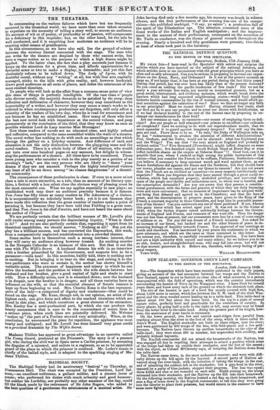THE NATIONAL DEFENCE QUESTION.
TO THE EDITOR OF VIE SPECTATOR.
Pencarrow, Bodmin, 17th January 1848.
MT DEAR Sits—I have read in the Spectator with sorrow and surprise the articles which you have inserted on the subject of the national defences, and which articles seem to me inconsistent with the great principles which you have so often and so ably advocated. Can you be serious in proposing to increase our expen- diture on the Army, Navy, and Ordnance? Is it not at the present moment as large as, if not larger than, it has been at any period during the last thirty years? Daring that period, has war ever been less likely than at the present moment? Do you count as nothing the pacific tendencies of free trade? Did we not for many a year advocate free trade, not merely on economical grounds, but as a great social, international, and civilizing measure, which would break down the barriers which had long separated neighbouring states—would bind together hitherto hostile communities by the ties of mutual interest, and would afford po- tent securities against the calamities of war? Have we then no longer any faith in our principles? Must we recant them? Having obtained free trade, shall our first act be to arm our peoples and to cover our shores with fortifications, as if we had declared hostility to the rest of the human race by proposing to ex- change our manufactures for their food?
Are our revenues so vast, so excessive—our means of employing them so defi- cient? Are our people so well educated—our prisons so excellent—our railroads all completed? have we nothing to do with our superabundant wealth, that we must squander it to guard against imaginary dangers? You will say the dan- gers are real. Prove them to be so. "In vain," the Duke of Wellington tells us, he has "endeavoured to awaken the attention of different Administrations." Peel, Graham, and the Tories, would not be alarmed: what has frightened you and the Whigs? You say that "the next attack on England will probably be without notice "I—" Five thousand (Frenchmen) might inflict disgrace on some defenceless post; five hundred might insult British blood at Herne Bay or even inflict indelible shame on the empire at Osborne House"!! Good God, can it be possible that you, whom I ranked so high among the public instructors of this nation—that you consider the French to be ruffians, Pindarees, freebooters—that you believe it necessary to keep constant watch and ward against them, as our Saxon forefathers did against the Danes and the Nordmen, lest they should burn our towns, plunder our coasts, and put our Queen to ransom! Are you not aware that the French are as civilized as ourselves—in some respects intellectually our superiors? Have you forgotten that they have passed through a great social re- volution, which has equalized property, abolished privilege, and converted the mass of the people into thrifty and industrious men, to whom war is hateful, and the conscription detestable? Are you not aware that they possess a constitu- tional government, with the forms and practice of which they are daily becoming more and more conversant; that no measure of importance can be adopted with- out being first debated and agreed to in the Chambers; and that the love of peace, and the determination to preserve peace, have given to the King of the French a constant majority in those Chambers, and kept him in peaceable posses- sion of his throne? Can you controvert any one of these positions? If not, whence this panic terror which has seized upon you? It was not so in the winter of 1840, when the Syrian dispute raised unfriendly feelings between the Govern- ments of England and France, and rumours of war were rife. Then the danger was not less than at present, but our armaments were less by a cost of some couple of millions or so. Yet you did not dream of a French invasion. You asked for no increase of our forces, but backed me and the other friends of peace in de- nouncing feelings of hostility towards France. You approved of our meetings at Leeds and elsewhere. You sanctioned by your praise the sentiments to which we gave utterance, and which are the same as those contained in this letter. Let me entreat you therefore, to carefully reconsider this question. You have been and are a high authority with myself and many others; for we believe you to be an able, honest, and straightforward man, who may fall into error' but will not on that account persevere m it. Believe me, therefore, with every feeling of per- sonal respect,


























 Previous page
Previous page